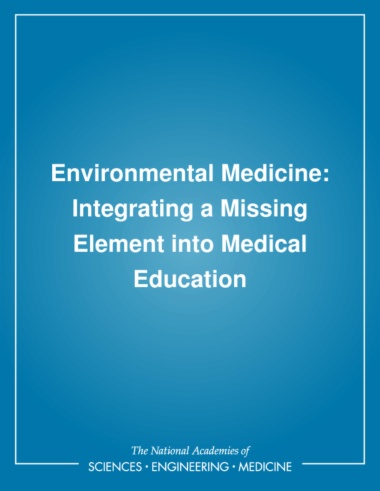People are increasingly concerned about potential environmental health hazards and often ask their physicians questions such as: "Is the tap water safe to drink?" "Is it safe to live near power lines?" Unfortunately, physicians often lack the information and training related to environmental health risks needed to answer such questions. This book discusses six competency based learning objectives for all medical school students, discusses the relevance of environmental health to specific courses and clerkships, and demonstrates how to integrate environmental health into the curriculum through published case studies, some of which are included in one of the book's three appendices. Also included is a guide on where to obtain additional information for treatment, referral, and follow-up for diseases with possible environmental and/or occupational origins.
- Cover
- Front Matter
- Executive Summary
- 1 Introduction
- 2 Curriculum Content
- 3 Implementation Strategies
- 4 Changing Medical Education
- 5 Concluding Remarks
- References
- Appendixes
- A: Taking an Exposure History
- B: Medical School Courses and Clerkships: Access Points for Integrating Environmental Medicine
- C: Case Studies in Environmental Medicine
- Case Study 1: Arsenic Toxicity
- Case Study 2: Seasonal Arsenic Exposure from Burning Chromium-Copper-Arsenate-Treated Wood
- Case Study 3: Asbestos Toxicity
- Case Study 4: Benzene Toxicity
- Case Study 5: Beryllium Toxicity
- Case Study 6: Cadmium Toxicity
- Case Study 7: Fetal Death Due to Nonlethal Maternal Carbon Monoxide Poisoning
- Case Study 8: Carbon Tetrachloride Toxicity
- Case Study 9: Chlordane Toxicity
- Case Study 10: Chronic Reactive Airway Disease Following Acute Chlorine Gas Exposure in an Asymptomatic Atopic Patient
- Case Study 11: Chromium Toxicity
- Case Study 12: Cyanide Toxicity
- Case Study 13: Dioxin Toxicity
- Case Study 14: Ethylene/Propylene Glycol Toxicity
- Case Study 15: Formalin Asthma in Hospital Staff
- Case Study 16: Gasoline Toxicity
- Case Study 17: Hantavirus Pulmonary Syndrome: A Clinical Description of 17 Patients with a Newly Recognized Disease
- Case Study 18: Lead Poisoning from Mobilization of Bone Stores During Thyrotoxicosis
- Case Study 19: Lead Toxicity
- Case Study 20: Legionaires' Disease: Description of an Epidemic of Pneumonia
- Case Study 21: Mercury in House Paint as a Cause of Acrodynia: Effect of Therapy with N-Acetyl-D, L-Penixillamine
- Case Study 22: Mercury Toxicity
- Case Study 23: Methanol Toxicity
- Case Study 24: Methylene Chloride Toxicity
- Case Study 25: Paint Remover Hazard
- Case Study 26: Fatal Outcome of Methemoglobinemia in an Infant
- Case Study 27: Nitrate/Nitrite Toxicity
- Case Study 28: An Outbreak of Nitrogen Dioxide-Induced Respiratory Illness Among Ice Hockey Players
- Case Study 29: Pentachlorophenol Toxicity
- Case Study 30: Aldicarb Poisoning: A Case Report with Prolonged Cholinesterase Inhibition and Improvement After Pralidoxime Therapy
- Case Study 31: Cholinesterase-Inhibiting Pesticide Toxicity
- Case Study 32: Infertility in Male Pesticide Workers
- Case Study 33: Pesticide Food Poisoning from Contaminated Watermelons in California, 1985
- Case Study 34: Poisoning of an Urban Family Due to Misapplication of Household Organophosphate and Carbamate Pesticides
- Case Study 35: Polynuclear Aromatic Hydrocarbon (PAH) Toxicity
- Case Study 36: Polychlorinated Biphenyl (PCB) Toxicity
- Case Study 37: Ionizing Radiation
- Case Study 38: Radon Toxicity
- Case Study 39: Residential Radon Exposure and Lung Cancer in Sweden
- Case Study 40: Community Oubreaks of Asthma Associated with Inhalation of Soybean Dust
- Case Study 41: Tetrachloroethylene Toxicity
- Case Study 42: Toluene Toxicity
- Case Study 43: Occupational Asthma Due to Toluene Diisocyanate Among Velcro-like Tape Manufacturers
- Case Study 44: 1,1,1-Trichloroethane
- Case Study 45: Trimethyltin Encephalopathy
- Case Study 46: Trichloroethylene Toxicity
- Case Study 47: Vinyl Chloride Toxicity
- Case Study 48: Work-Related Disorders of the Neck and Upper Extremity
- Case Study 49: Contact Dermatitis in Surgeons from Methylmethacrylate Bone Cement
- Case Study 50: Skin Lesions and Environmental Exposures: Rash Decisions
- Case Study 51: Acoustic Trauma Caused by the Telephone: A Report of Two Cases
- Case Study 52: Behavioral and Audiologic Manifestations of Noise-Induced Hearing Loss
- Case Study 53: Reproductive and Developmental Hazards
- Case Study 54: Childhood Asthma and Indoor Enviromental Risk Factors
- Case Study 55: Populations at Risk From Particulate Air Pollution - United States, 1992
- D: Resources: Agencies, Organizations, Services, REferences, and Tables of Environmental Health Hazards
- E: Committee and Staff Biographies

